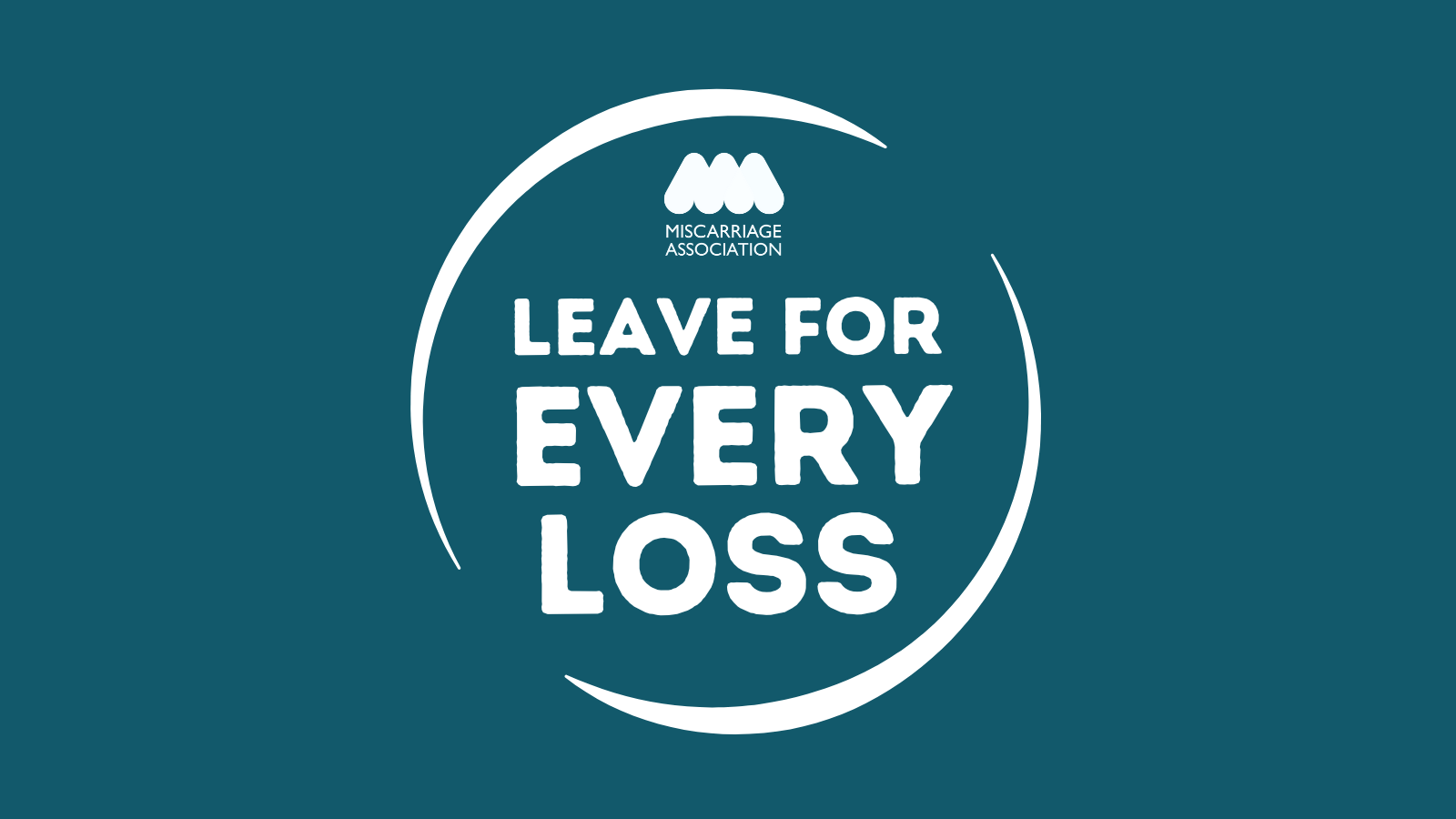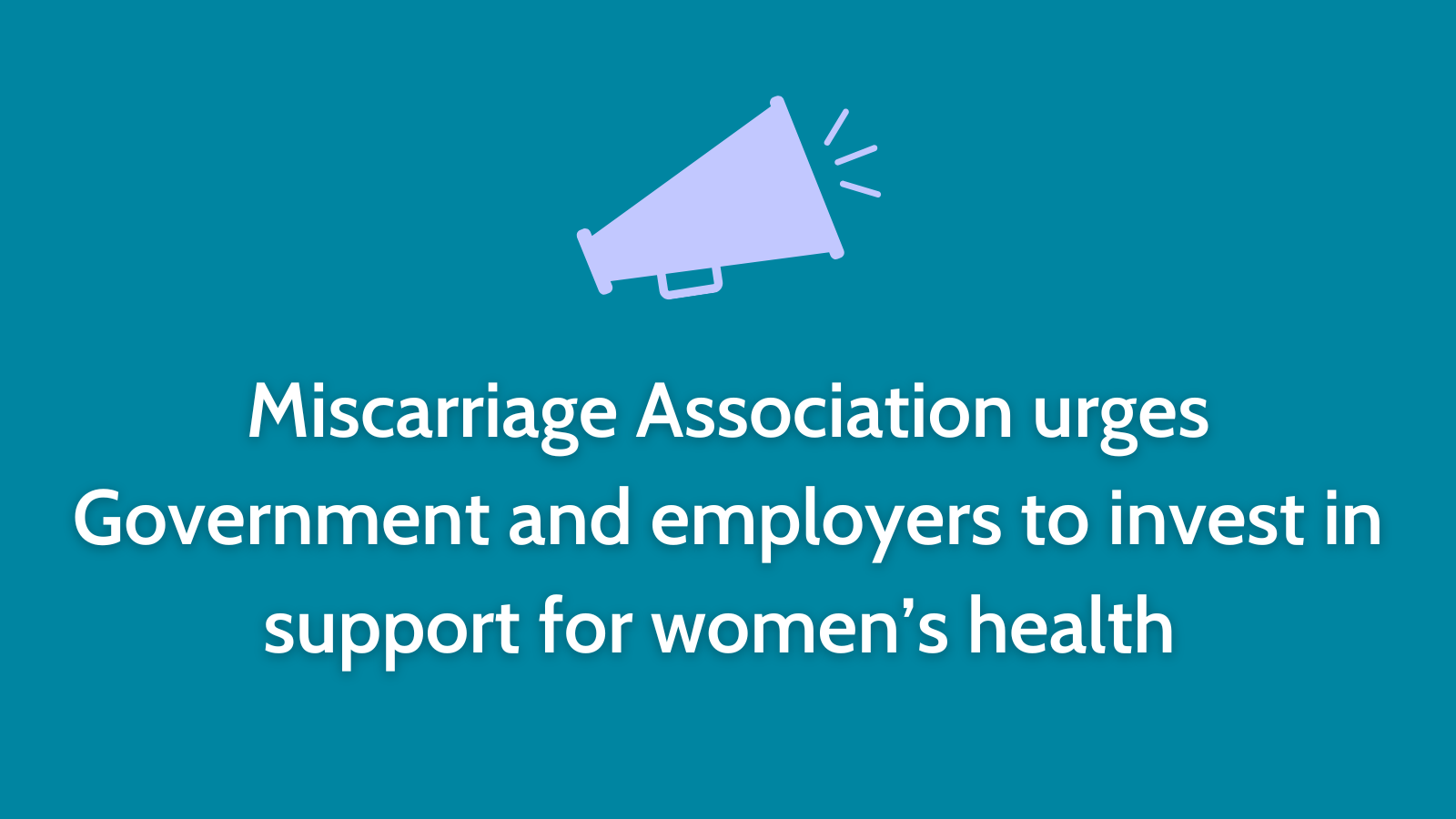Miscarriage Association launches Leave for Every Loss campaign calling for bereavement leave reform
12th December 2024

We’re calling for a vital change in the law so that women and their partners who experience a pre-24 week pregnancy loss have the legal right to take bereavement leave from work.
Our Leave for Every Loss campaign comes in response to overwhelming public support for equitable parental bereavement leave and highlights the emotional, physical, and social toll of pregnancy loss.
Statutory bereavement leave (two weeks for both parents) currently only applies after 24 weeks of pregnancy, leaving those who experience miscarriage or other pre-24-week loss, to rely on sick leave or the goodwill of their employers. Partners have no legal entitlement to leave, further compounding the taboo of miscarriage in addition to the stress and isolation felt by grieving families.
We’re calling for this to change.
Survey findings show overwhelming public support
A new, nationally representative poll commissioned by the Miscarriage Association and carried out by Public First*, highlights overwhelming public support for bereavement leave reform:
- 9 in 10 (89%) respondents agree that the loss of a baby at any stage of pregnancy can be felt as a bereavement.
- 8 in 10 (79%) agree that bereavement leave for miscarriage should match the rights currently given to parents who lose a child or experience stillbirth (the loss of a baby after 24 weeks of pregnancy).
Vicki Robinson, Chief Executive of the Miscarriage Association, said:
“Pregnancy loss at any gestation can be truly devastating and for most who experience it, it represents the death of their baby, regardless of how early it happens. Those grieving deserve the time and support to begin to heal without the added pressure of financial or workplace insecurity. It is deeply encouraging that the overwhelming majority of those polled recognise the importance of this.
“Requiring someone to take sick leave after a miscarriage reinforces harmful feelings of failure or self-blame. While it involves physical symptoms, miscarriage is not simply an illness and it’s time for the law to reflect this.”
Sarah Owen MP, who supports the Miscarriage Association’s campaign, said ahead of the inquiry:
“Like thousands of women, I have sadly experienced pregnancy loss, so this inquiry is personal.
“I was not prepared for the grief of miscarrying. It happened at work during my first pregnancy. I was even more shocked to find I was not entitled to bereavement leave but legally had to take sick leave.
“I was not sick, but grief stricken, harbouring a deep sense of loss. This happens to approximately one in four pregnancies and yet legislation has not caught up with this stark reality. The law urgently needs to change to give everyone who is the one in four the time to heal.”
Corporate and charity support
We are incredibly proud to have the backing of leading employers – including the Co-op – in supporting their Leave for Every Loss campaign – as well as the Trades Union Congress (TUC) and the teachers’ union NASUWT.
Shirine Khoury-Haq, Chief Executive of Co-op, said:
“The ‘Leave for Every Loss’ campaign is a vital step towards ensuring no one facing pregnancy loss is left without the time or support they need. Legislative reform in this area isn’t just about fairness – it’s about recognising the realities of loss as a form of bereavement and building workplaces that truly care. We are proud to stand alongside the Miscarriage Association in calling for this much-needed change.”
Leave for Every Loss is also endorsed by fellow pregnancy, baby loss and women’s rights charities, including Tommy’s, The Ectopic Pregnancy Trust, Sands, Antenatal Results and Choices, Aching Arms, the NCT (National Childbirth Trust), and Pregnant Then Screwed.
Trailblazing organisations already offering paid leave for pregnancy loss include NHS England, John Lewis, Channel 4, the Co-op, and M&S.
At the recent Women and Equalities Committee inquiry, Thomas Simons, Chief Human Resources and Organisation Development Officer at NHS England – which provides two weeks of paid leave for those experiencing a miscarriage and five days for their partners – stated:
“There’s no reason why employers can’t put this in place … We looked at what the maximum level of exposure would be across the NHS, and we equated it to be 0.01%, and that was without considering the benefits on retention, turnover, absence, staff engagement, productivity … It was negligible.”
Your voices heard
Our Leave for Every Loss campaign draws on the stories of those affected by miscarriage, many of whom report struggling to access support or feeling pressured to return to work too soon. In some cases, like Nicola’s, partners were unable to attend hospital appointments or invasive medical procedures due to a lack of workplace rights.
Nicola McGowan, said:
“I was very lucky and was given bereavement leave by my employer, but my husband had a difficult time. There were no options for annual leave, and he didn’t get paid if he phoned in sick.
“After miscarrying twins, I was taken straight to A&E for surgery. I phoned my husband at work to let him know, and his boss said it was selfish of me not to have waited to call until the end of the working day. My husband had lost his babies, too.”
A call for action
As it is currently presented, the Employment Rights Bill, progressing through Parliament, paves the way for bereavement leave for a greater range of losses, but does not include pre-24 week pregnancy loss. We want to see the bill urgently amended to correct this inequality.
For our full press release, click here.
*Public First carried out a nationally representative poll of 2,009 people from 18-20 November 2024. Poll results are based on the 1,842 respondents who consented to answer questions about pregnancy and pregnancy loss. Public First is a policy, strategy and opinion research consultancy, a company partner of the Market Research Society and a member of the British Polling Council. See www.publicfirst.co.uk.

